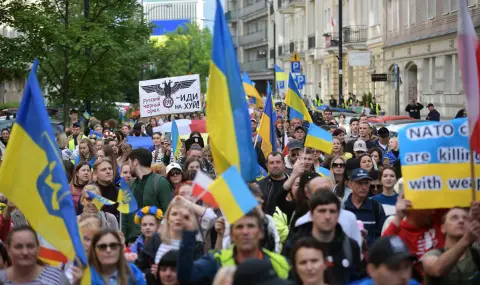The blue-and-yellow Ukrainian flags that used to be everywhere in Poland are now almost invisible; information points for newly arrived refugees have disappeared. Russian trolls on social networks have managed to suggest that Ukrainians living in Poland are “drones“ who receive excessively high social benefits, and that because of them Poles cannot quickly go to the doctor for a check-up, writes “Tageszeitung“.
Social polls show a decline in approval of Ukrainian refugees. Only on the issue of military support for Ukraine do most Poles agree – it must continue.
Violence against Ukrainians
Ukrainian historian Oleksandr Pestrykov, who has been working in Warsaw for ten years and researching Polish-Ukrainian relations, is familiar with the results of these surveys, but says that something else worries him much more: “In the last two years alone, Ukrainians in Poland have been attacked, beaten or threatened 400 times“.
Threats have also been made to the “Ukrainian Home” foundation, where Pestrykov works - gallows and swastikas were painted on the walls of the building where it is housed. This is probably not an anti-Semitic act, but rather a Russian provocateur who wants to drive a wedge between Ukrainians and Poles, the German publication points out.
The tragic past is used to incite hatred
It also cites another case in which a slogan of the Ukrainian Insurgent Army /UPA/ - a partisan army and military wing of Stepan Bandera's Ukrainian nationalists, which also committed crimes against civilians - was written on the building. The slogan alluded to the mass murder of 100,000 Poles by Ukrainian nationalists and soldiers in 1943 during the so-called “Volyn massacre“. According to Pestrikov, this is particularly perfidious, since today most Ukrainians define this act as a crime and a mistake.
"But our neighbors here in Warsaw took it at face value. They thought we looked favorably on the Nazi collaboration of some of the UPA units of that time," Pestrikov says. He continues: "They accused us of considering Putin's planned "denazification" of Ukraine not so wrong."
Pestrikov also tells the "Tageszeitung" about other provocations to which the foundation has fallen victim, including being accused of advertising the Polish presidential candidate and current mayor of Warsaw, Rafal Trzaskowski, during the election.
Rumors, trolls and cyberwar
"And this was certainly a Russian provocation," Pestrikov is convinced. He points to the fact that in one of the outraged letters they received, the word "mayor" was written in Russian, in Cyrillic. The historian is convinced that someone automatically translated the text on the Internet and the word remained in the original. “On this occasion, there is already a rumor in southern Poland that Trzaskowski enjoys the support of supporters of the Ukrainian nationalist Stepan Bandera and that the mayor of Warsaw was not a Polish patriot, but a traitor.“
The same scheme - about the “traitor“ - is constantly used against Prime Minister Donald Tusk, who is alleged to have been a man of Berlin and also a traitor, writes “Tageszeitung“. The publication quotes Pestrikov as saying that a cyberwar has long been waged against Poland from the East, which the security forces have difficulty dealing with.
Social envy
There are more and more comments on the Internet filled with hatred against refugees and migrants, who are allegedly criminals, corrupt and sick. In 2024 alone, nearly 74 million social media users in Poland viewed and read fake news or posts filled with hatred against Ukrainians, the investigative portal “Oko“ found.
Right-wing unions and parties such as “PiS“, which was in power in Poland until the end of 2023, are further fueling social envy, the German publication notes. In addition, the right-wing organizes border blockades and claims that Ukrainian products do not meet EU standards – i.e. low-quality fruits, vegetables and meat were entering the Polish market.
Many Polish politicians are adapting their statements to the majority opinion. Meanwhile, even Trzaskowski, who is a favorite for the presidential election, is calling on Ukrainian parents to no longer receive child benefits if they do not work and do not pay taxes in Poland. On this occasion, Pestrykov says: “This unfortunately worsens the attitude towards all of us. But in practice, such a law would have almost no effect, since between 70 and 80 percent of Ukrainian refugees in Poland work. And the rest are exceptions, for example, due to illness or disability. Older Ukrainians, on the other hand, do not receive their pensions from the Polish state, but from the Ukrainian one.
Most Ukrainians want to work
However, right-wing parties recently submitted bills to parliament demanding that all social benefits be suspended - only for Ukrainians. Moreover, Poland has already suspended almost all social payments - the state provides only child benefits of 200 euros per month until the age of 18, as well as assistance for school education and medical services. Anyone who does not work is practically left without money, unless their family in Ukraine supports them financially. Most Ukrainians are trying to get rid of the refugee stigma anyway - because they are not looked down upon in Poland. The work ethic in Polish society is such that they respect people who earn their own living, Pestrykov explains. That is why Ukrainians are massively seeking to obtain the status of “labor migrant”. And their number is growing.
